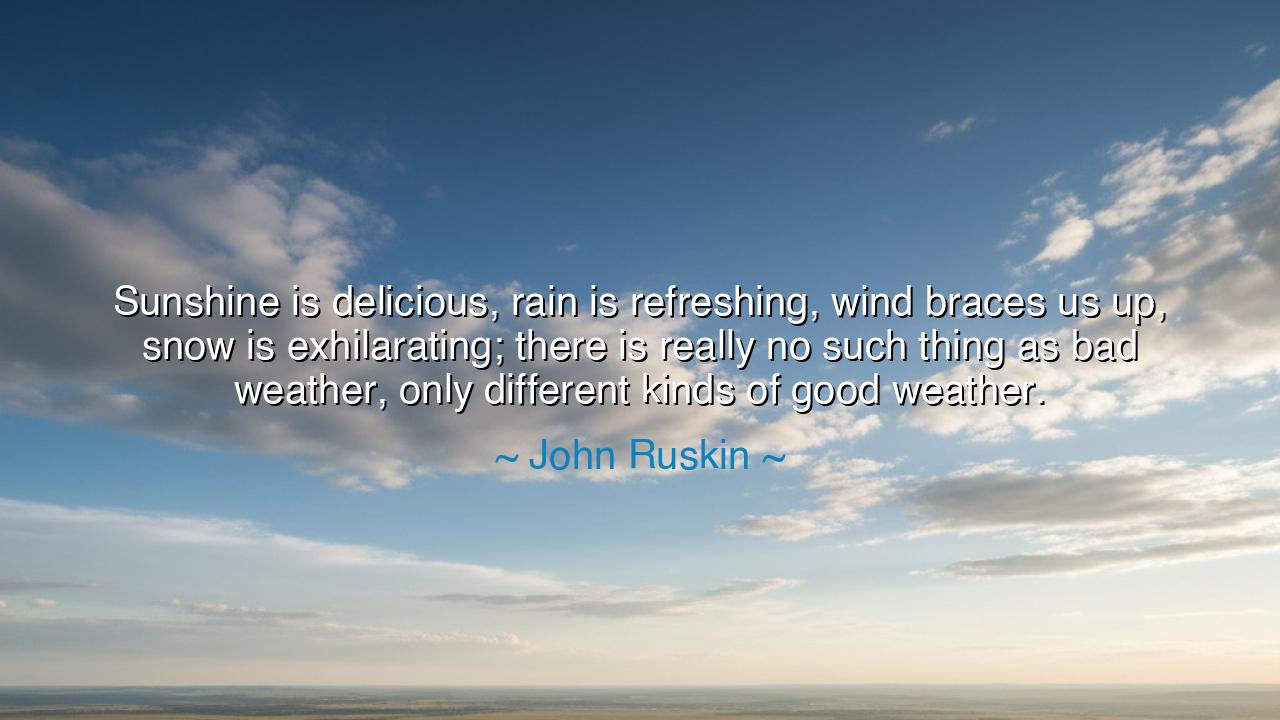
Sunshine is delicious, rain is refreshing, wind braces us up
Sunshine is delicious, rain is refreshing, wind braces us up, snow is exhilarating; there is really no such thing as bad weather, only different kinds of good weather.






Hearken, children of the earth, to the words of John Ruskin, who beheld the sky and the elements with reverent delight: "Sunshine is delicious, rain is refreshing, wind braces us up, snow is exhilarating; there is really no such thing as bad weather, only different kinds of good weather." In these words lies a meditation upon the harmony of nature, the richness of perception, and the art of finding joy and renewal in all conditions. Ruskin teaches that life itself, like the weather, offers gifts in every form, and that the discerning soul learns to embrace, rather than lament, each variation.
The first revelation is that attitude shapes experience. Sunshine warms and delights, rain nourishes and restores, wind strengthens and invigorates, snow exhilarates and enlivens. Each manifestation of the natural world carries a unique quality, and each may awaken faculties of perception, endurance, and gratitude. To call any weather “bad” is to deny the richness inherent in difference and to overlook the subtle blessings it brings.
History offers a vivid mirror of this truth. Consider George Washington and his army at Valley Forge. Harsh winter, icy winds, and unyielding snow tested the resolve of men and women alike. Yet in enduring these trials, they gained fortitude, discipline, and unity, transforming suffering into strength. Ruskin’s insight reminds us that even adversity carries hidden gifts, and that the elements, however fierce, may nurture resilience and courage.
Ruskin also teaches the interconnectedness of human perception and nature. Just as the mind may interpret events as good or bad, so too may the weather inspire fear or delight. Those who perceive the deliciousness, refreshment, and exhilaration in each state are practicing an ancient art: finding the blessings inherent in all things, attuning themselves to the rhythms of the earth and the cycles of life.
Even in modern life, the lesson endures. Sailors navigating stormy seas, farmers tending crops through drought and rain, and travelers crossing mountains in sun and snow all discover that every condition holds opportunity—for growth, for reflection, for experience. Ruskin’s wisdom teaches that the world offers gifts in forms that are sometimes subtle or challenging, and that joy arises from attentive engagement, not mere comfort.
The metaphor extends also to the inner life. Our emotions, challenges, and circumstances are like weather: bright days of happiness, storms of conflict, gentle rains of reflection, and snowfalls of clarity. By perceiving each experience as a form of good weather, we cultivate resilience, gratitude, and an attuned, flourishing spirit. Ruskin’s words encourage the cultivation of mindful perception and joyful acceptance.
Practically, the lesson is to embrace life’s variety with attention and gratitude. Observe each day as a gift, whether it brings sunshine or storm, ease or challenge. Seek the nourishment, strength, and exhilaration hidden within, and allow yourself to be invigorated by difference rather than discouraged by discomfort. In this practice, life itself becomes a continual source of wonder and vitality.
Thus, let this teaching echo through the generations: there is no such thing as bad weather, only different kinds of good weather. Sunshine warms, rain refreshes, wind braces, snow exhilarates, and every moment offers a lesson, a delight, or a strengthening of the soul. By attuning the heart to the gifts in all conditions, one learns to live fully, joyfully, and resiliently, dancing with the elements of life as they unfold.






AAdministratorAdministrator
Welcome, honored guests. Please leave a comment, we will respond soon